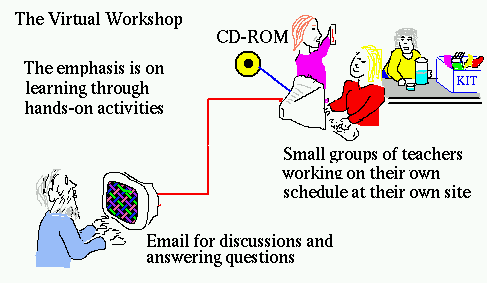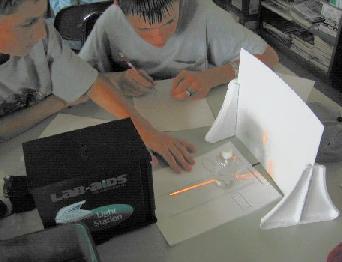| Over the last decade, physicists at the University of Kentucky have been developing courses for pre-service and in-service teachers that promote the inquiry approach to science teaching. For pre-service teachers we offer PHY 160, a three-credit course required of all pre-service elementary teachers. The Physics by Inquiry texts of Professor Lillian McDermott, et al, are used extensively in the standards-based and inquiry-oriented course meeting six hours per week in a laboratory setting. With support from the NSF through the Appalachian Mathematics-Science Partnership, similar courses are being developed at other Kentucky universities and colleges. Much of the leadership for this project comes from University of Kentucky science and mathematics departments including the Department of Physics & Astronomy. Better ways to help pre-service teachers is tied to better ways to help in-service teachers, and this aspect of the NSF project involves summer institutes and follow-up mentoring. 
For in-service teachers, we also offer three one-credit-hour physics courses for professional development or graduate credit to intermediate and middle grade teachers (grades 4-9), on the topics Light, Temperature and Heat, and Electricity and Magnetism. The courses, developed with support from the fund for the Improvement of Postsecondary Education, U. S. Department of Education, emphasize content understanding of physics topics important for teachers, and promote learning through inquiry activities. Its elements are a kit of equipment, a manual of activities, a CD to provide instruction, and the use of email to communicate with the instructors. Hands-on activities and learning through concrete experiences play a central role in these courses, even though they are delivered in a distance-learning format. Much of the instructional material is directly transferable to participants' classrooms. For previews of the courses and more description of how they work, visit http://www.pa.uky.edu/sciworks/intro.htm. 
Lab-Aids, Inc is now rewriting these kits and activities at U.K. for national distribution. Already released are the modules Investigating Light and Color and Spectrum; a third module Reflection and Refraction is in the editorial process. Students who have been taught by the teachers we have trained are already beginning to arrive at the university, and we are beginning to reap the benefits of our efforts to improve teacher preparation. Contact: Joseph P. Straley, Department of Physics & Astronomy, University of Kentucky, Lexington, KY 40506-0055, (859) 257-3197 |